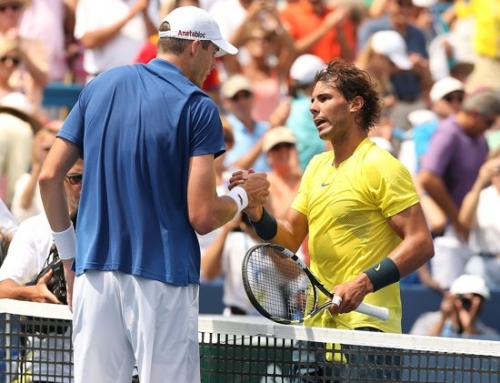 Let’s rewind the clock some–back to 2008.
Let’s rewind the clock some–back to 2008.
2008 was the year of the previous Olympics, back in Beijing. Andy Roddick decided not to play the Olympics that year, hoping that he could do well in the US Open series with a depleted field due to the Olympics. Heading into Los Angeles, he reached the finals and played a relatively hot player by a then relatively unknown Juan Martin del Potro. del Potro’s rank was low enough when the Olympic draw was made that he didn’t qualify to play.
del Potro had just won Stuttgart and Kitzbuhel and headed over to the US. In the finals, he beat Roddick, 61 76. At the next event, del Potro went to Washington DC and made another final where he beat Viktor Troicki. Roddick lost to Troicki in the semis, and his confidence was shot.
Perhaps if Roddick had known del Potro would reach the top 5, he wouldn’t have fretted so much.
del Potro would then make progress beating his nemesis, Roger Federer, the following year. In 2009, del Potro pushed Federer to five sets in the French Open semis. Finally, del Potro broke through at the US Open, crushing Nadal in the semis (who was likely injured, but even so), and taking down Federer in five sets.
2010 was a year del Potro would soon forget. After making a reasonable run at the Australian Open, he injured his wrist which required surgery. del Potro wasn’t expected to return until after the US Open in 2010. He returned for two tournaments, but due to early exits, he opted to not play the rest of the year, and focus on practice.
By 2011, del Potro made a pretty strong push to winning ways, and even won tournaments. However, he was less intimidating than before. He didn’t quite have the same power on his serve or forehand and opted, strangely enough, to play a steadier game, something big men like del Potro rarely do.
del Potro got his rank to about 10 in the world, but failed to qualify for the year-end finals, and had numerous losses to Roger Federer who, once again, found mastery of the tall Argentine.
It was thought that del Potro’s recovery was pretty good, but 2012 would be the year that he’d start to play the kind of tennis he played in 2009.
But there was a problem.
Roger Federer.
In the 2012 Australian Open, Federer beat del Potro in the quarters of the Australian Open. In Rotterdam, Federer beat del Potro in the final. In Dubai, del Potro lost to Federer in the semis. In Indian Wells, del Potro lost to Federer in the quarters. In the French Open, Federer beat del Potro in 5 sets in the quarters.
OK, Federer wasn’t del Potro’s only problem. He also lost to Ferrer, Djokovic, and players like Tsonga and Berdych. But Federer had a lot to do with why he didn’t win as much this year.
del Potro apparently came out of the blocks strong, and secured the only break in the entire match. del Potro won the first set 64. The second set went to tiebreak where Federer played a decent tiebreak to win it. The difference probably lay in the third set where Federer, with chances to break, never broke. Indeed, del Potro had five break points and saved all five for the entire match. This pushed the match into a tiebreak where Federer played a few loose points and lost, 7-3.
With that, Federer decided to skip Paris. As a veteran with a certain number of wins, Federer can skip a Master 1000 without penalty (other than gaining no points–the penalty for skipping a tournament is losing points at a second tournament). With that, Federer will lose 1000 points, plus the 200 points for not defending Basel. Federer trails Djokovic by 2000 points in points earned since January 1, and that’s if Djok0vic doesn’t play the rest of the year.
Federer won 300 points, is skipping Paris, and can, at most, win 1500 points in London, and therefore has conceded number 1 to Djokovic. Federer should keep number 1 for one more week only because Djokovic chose to skip Basel, an event he played last year (and lost in the semis) and Federer reached the finals, thus giving him just enough points to be ahead of Djokovic, but after Paris, Djokovic will move ahead because Federer will drop 1000 points regardless of what Djokovic does, and that should close the gap for Djokovic to get ahead and stay ahead.
In Valencia, David Ferrer shows why he’s the toughest out. Although Ferrer is thought of as a clay courter, he’s had plenty of success on faster surfaces. He played the unpredictable Alexander Dolgopolov and won in 3 sets.
Next week, Paris, the last Masters 1000 of the year.



![[Basel] del Potro wins Basel over Federer for second consecutive year](https://www.essentialtennis.com/wp-content/uploads/2013/10/20131028delpo-500x383.jpg)


![[Cincinnati] Nadal wins 26th Masters 1000 title with win over Isner 7-6, 7-6](https://www.essentialtennis.com/wp-content/uploads/2013/08/20130818rafa-500x383.jpg)
![[Montreal] Nadal crushes Raonic to win 25th Masters 1000 title](https://www.essentialtennis.com/wp-content/uploads/2013/08/20130811nadal-500x383.jpg)